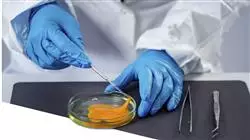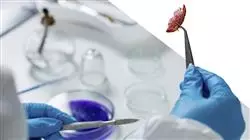University certificate
The world's largest faculty of nutrition”
Description
A university program that will bring you closer to the most recent contribution of Food Epidemiology in disease prevention”

In recent decades, an increase in zoonoses has been detected as a result of changes in the environment caused, to a large extent, by the effects of human actions on ecosystems. This is a problem of concern and is the subject of work in different disciplines, including Food Epidemiology. However, advances in the detection of pathogens, analytical techniques and rigorous quality measures in the food industry give a halo of hope in a complex scenario that requires advanced knowledge and increasingly specialized professionals.
In this scenario, the Nutrition professional who is knowledgeable in this field must be aware of the latest developments and current scientific studies focused on improving human health through an adequate diet and quality standards. A panorama that requires, therefore, a constant updating that the specialist can obtain through this postgraduate diploma in Food Epidemiology.
A program that will deepen over 6 months in the advances in the prevention of diseases from dairy products, meat, pastries or canned food consumption; progress in studies focused on metabolism of each nutrient and micronutrient or the requirements for compliance with ISO 22000 standards.
For this purpose, students have at their disposal at any time of the day video summaries of each topic, videos in detail, diagrams or essential readings, which will provide them with the most updated information in this field. A theoretical approach is complemented by the practical vision of this program, thanks to the case studies provided by the experts who teach this program.
A postgraduate diploma designed by TECH to give the professional the opportunity to be up to date in this field through a 100% online program that you can access comfortably, wherever and whenever you want. Students only need an electronic device (computer, tablet or cell phone) with an Internet connection to visualize the content hosted on the virtual campus. In addition, the Relearning System, methodology used by this academic institution, health personnel will be able to advance, in a much more natural and progressive way, through the syllabus of this program.
An academic option designed for professionals like you, who wish to study a postgraduate diploma without neglecting other areas of your personal life”
This postgraduate diploma in Food Epidemiology contains the most complete and up-to-date educational program on the market. Its most outstanding features are:
- The development of case studies presented by experts in Food Technology
- Graphic, schematic, and practical contents with which they are created, provide scientific and practical information on the disciplines that are essential for professional practice
- Practical exercises where self-assessment can be used to improve learning
- Its special emphasis on innovative methodologies
- Theoretical lessons, questions to the expert, debate forums on controversial topics, and individual reflection assignments
- Content that is accessible from any fixed or portable device with an Internet connection
You will get to know the latest techniques used in food analysis thanks to the multimedia resource library available 24 hours a day”
The program’s teaching staff includes professionals from the sector who contribute their work experience to this educational program, as well as renowned specialists from leading societies and prestigious universities.
Its multimedia content, developed with the latest educational technology, will provide the professionals with situated and contextual learning, i.e., a simulated environment that will provide an immersive education programmed to learn in real situations.
The design of this program focuses on Problem-Based Learning, by means of which the professionals must try to solve the different professional practice situations that are presented throughout the academic course. For this purpose, the students will be assisted by an innovative interactive video system created by renowned experts.
Get in 6 months an update of your knowledge on the factors that influence proper nutrition"

A university program that will take you to the current reality of food and its perception by society"
Objectives
TECH has developed this postgraduate diploma to offer the specialist the most current scientific evidence on Environmental Epidemiology. Thus, at the end of this program, students will be aware of the main problems associated with the use of food additives, the social and economic implications of zoonosis, as well as the corrective and preventive measures promoted. All this, in addition, thanks to the content elaborated by specialists, with whom they will be able to solve any doubt that arises about the subject matter.

The theoretical and practical approach of this postgraduate diploma will allow you to be up to date on current quality controls and ISO 22000 standards”
General Objectives
- Appreciate and recognize the sanitary and preventive importance of cleaning, disinfection, disinsecting and pest control programs in the food chain
- Collaborate in the implementation of quality systems
- Evaluate, control and manage aspects of traceability in the food supply chain
- Plan and implement health promotion and prevention programs
- Develop and establish food education guidelines
Specific Objectives
Module 1. Food and Public Health
- To know the distinguishing fact of human nutrition, interrelationships between nature and culture
- Acquire a good understanding of individual and social eating behaviors
- Identify health problems associated with the use of food additives
- Classify the main social and economic implications of zoonoses
Module 2. Quality and Food Safety Management
- Design and evaluate tools that promote food safety management throughout the food chain to protect public health
- Identify and interpret the requirements of the food safety management standard (UNE EN ISO 22000) for its subsequent application and evaluation in food chain operators
- Develop, implement, evaluate and maintain appropriate hygiene practices, food safety and risk control systems
- Participate in the design, organization and management of different food services
Module 3. Fundamentals of General Physiology
- Classify the nutrients that make up food
- Understand the range of factors that determine and condition nutrition
- Outline the metabolism of each nutrient and micronutrient, and their recommended intakes
- Understand different principles applied to physiological knowledge for human health
- Identify the factors influencing human nutrition
- Interpret the basic structure of the nervous and endocrine systems, as well as the action mechanisms of the respective hormones

Thanks to the Relearning method, you will easily advance through the content of this program and reduce the long hours of study”
Postgraduate Diploma in Food Epidemiology
Food safety is a fundamental aspect for public health and the welfare of society. Food epidemiology is a scientific discipline that studies the risks associated with food consumption and seeks to prevent and control foodborne disease outbreaks. In the Postgraduate Diploma in Food Epidemiology at TECH Global University, we will provide you with the knowledge and skills necessary to assess food risks and design effective strategies to prevent the spread of foodborne diseases. This program is aimed at health professionals, food scientists and food industry professionals who wish to specialize in food risk assessment and foodborne disease prevention.
In our Postgraduate Diploma in Food Epidemiology program, we offer you practical and up-to-date training in the field of food safety. Our program focuses on acquiring skills in food risk assessment, identification of foodborne disease outbreaks, analysis of epidemiological data and effective communication of results. In addition, special attention in this program will be given to the following aspects: the identification of risk factors and their management in the food chain; and the application of food standards and regulations.
"







